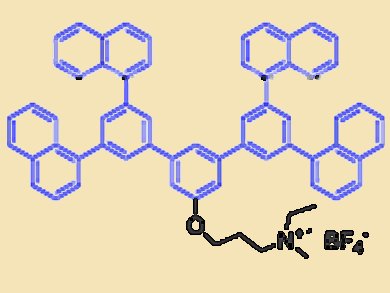Solution-processed functional materials are needed for low-cost, large-area organic light-emitting diodes (OLEDs). Conjugated polymer electrolytes and their small-molecule counterparts can function as electron-injection layers with cathode materials such as aluminum. These materials can be processed in alcoholic solvents and generally do not perturb the bottom layer of hydrophobic luminophors.
Xu-Hui Zhu and collaborators at South China University of Technology in Guangzhou investigated a series of small-molecule organic electrolytes with the BF4– counterion. The linear electrolytes consist of linked, substituted fluorenyl units, while their bulky counterparts are based on 1,3,5-substituted benzene derivatives.
The current-voltage and luminance efficiency properties of devices employing the different electrolytes show the linear structures to be most effective for electron injection. The concise synthesis, facile purification, and alcohol processability of these electrolytes makes them promising candidates for the development of low-cost organic light-emitting diodes.
- Alcohol-Processable Organic Amorphous Electrolytes as an Effective Electron-Injection Layer for Organic Light-Emitting Diodes,
Gang Liu, Yan-Hu Li, Wan-Yi Tan, Zhi-Cai He, Xiao-Tie Wang, Chi Zhang, Yue-Qi Mo, Xu-Hui Zhu, Junbiao Peng, Yong Cao,
Chem. Asian J. 2012.
DOI: 10.1002/asia.201200299



